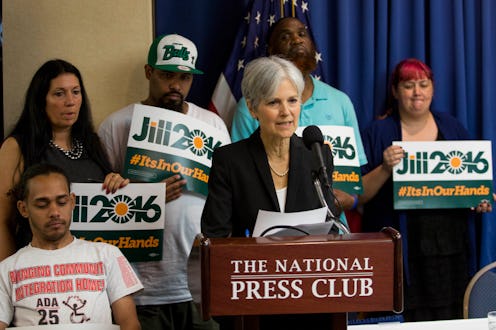News
How Johnson & Stein Could Make The Main Debates
You guys, what a year! Up is down, our favorite Blackberry-using Cabinet member turns out not to have known how to properly use email, and her Republican counterpart's presidential campaign has to be spoken to by the Secret Service. With all the ups and downs of this election ready to make even the most iron-stomached political observer hurl, it really feels like anything could happen. And given Hillary Clinton and Donald Trump’s consistently low favorability ratings in the polls, third-party candidates may have a real chance in this election. The latest question on everyone’s lips: Will Jill Stein or Gary Johnson join the Clinton-Trump debates?
The rules for whether or not a third-party candidate can join in the debates appear straightforward. They have to be on the ballot in enough states to win (i.e. enough states to get at least 270 electoral votes), and they have to have at least 15 percent of the vote in an average of five polls come mid-September. Right now, Libertarian Party nominee Johnson’s Real Clear Politics polling average is 8.4 percent, while Green Party nominee Stein’s average is 3.0 percent. Neither has broken the 15-percent barrier at any point in this election. Johnson’s highest share was 13 percent in a CNN/ORC poll from July, while Stein topped out at with 7 percent in a CNN/ORC poll in June.
But there’s still plenty of time for things to change. The volatility of this race has made things largely unpredictable, and there’s a feeling that both major party candidates are no more than a gaffe or scandal away from turning the race on its head.
Johnson and Stein even teamed up to file a lawsuit against the Commission on Presidential Debates (CPD), claiming that the 15-percent threshold is unfair, and violates antitrust laws as well as the First Amendment. However, a federal judge rejected the challenge in early August. Among the difficulties third-party candidates face is that getting the necessary national exposure to pass the 15 percent threshold comes with a hefty price tag — by some estimates, as much as $250 million. The last time a third-party candidate was at the debates was in 1992, when billionaire Ross Perot ran as an independent. For less financially outfitted candidates, polling at 15 percent might be as challenging as polling at 50 percent.
Still, nothing’s settled, and the CPD has advised the Clinton-Trump debate sites to prepare for the possibility of a third podium. “We won’t know the number of invitations we extend until mid-September,” CPD co-Chair Mike McCurry told Politico last week. If following this election has taught us anything, it’s to expect the unexpected. And that might mean good news for Johnson and Stein.
